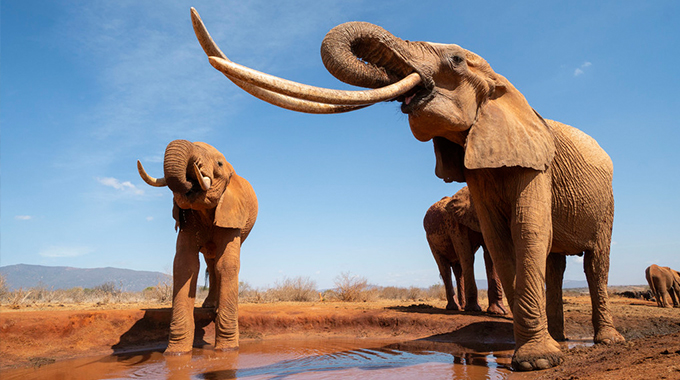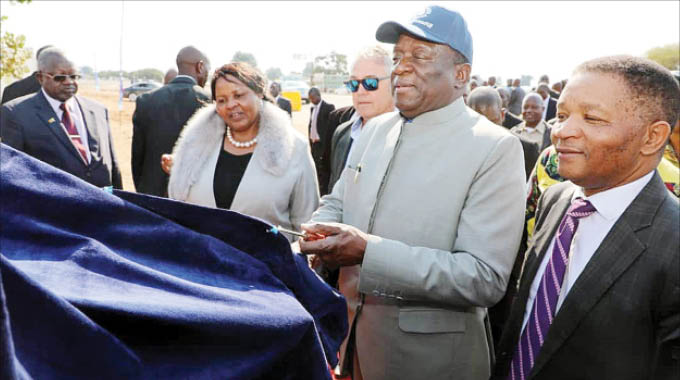Animal rights groups fail to hijack Africa wildlife summit

Emmanuel Koro, Correspondent
NON-Consumptive tourism which includes wildlife trophy hunting and hunting for meat contributes 90 percent of the tourism revenue that southern Africa generates annually said an Oxford University trained Associate Professor of ecology and economics, Dr Brian Child, speaking at the Africa Wildlife Economy Summit.
Dr Child said that non-consumptive tourism that includes travel tourism only contributes a distant 10 percent of southern Africa’s annual tourism revenue.
“If Africa is serious about growing wildlife economy it needs to grow both its non-consumptive and consumptive use tourism enterprises, particularly consumptive tourism that Dr Brian Child said contributes 90 percent of southern African countries’ annual tourism earnings,” said Dr Morrison Mtsambiwa, one of Africa’s top ecologists and former CEO of the Kavango Zambezi Transfrontier Conservation Area (where Botswana, Namibia, Zambia and Zambia share their borders) and former Director General of the Zimbabwe Parks and Wildlife Management Authority.
Beyond tourism enterprises, the growth of Africa’s wildlife economy can be further boosted by trade in Africa’s abundant wildlife products such as ivory and rhino horn.
Sadly, the text of the UNEP convened and Space for Giants (a western animal rights groups that is against hunting and ivory trade) sponsored Africa Wildlife Economy Summit held in Victoria Falls, Zimbabwe from June 24 to 25, 2019 was disturbingly silent on consumptive use economic activities such as hunting.
Therefore, the agenda that was set by Kenya-based UNEP and Space for Giants (SfG) to grow the African wildlife economy exclusively using non-consumptive tourism raised a lot of curious and puzzling questions than answers.
As the reality sank in that non-consumptive use was curiously excluded from the Summit agenda, the next and inevitable question was who would put it consumptive use on the Summit agenda?
To the relief of the pro-consumptive tourism delegates at the Summit, Zimbabwe’s President, Emmerson Mnangagwa authoritatively and refreshingly brought the consumptive use of wildlife issues on the Summit agenda while delivering his keynote address to the Africa Wildlife Economy Summit. To the shock and of course disappointment of animal rights groups, President Mnangagwa touched on hunting, a topic that was suspiciously excluded from the Summit agenda.
“Safari hunting is a vital cog in wildlife economy,” said President Mnangagwa. “Profits from hunting are used to provide water and fencing to reduce human wildlife conflict and law enforcement against poachers. We continue to call for free trade in hunting products as these have positive impact on the economies of our countries.”
This pro-hunting remark spelt doom and failure to the western animal rights groups’ attempt to exclude wildlife use from the Summit agenda. Of course they shared that shock with local anti-wildlife use tourism business leaders that had a hand in crafting the wrong and suspicious non-consumptive use ‘recipe’ for growing Africa’s wildlife economy.
President Mnangagwa said that the animal rights groups were wrong in their thinking that animals should not be used to sustain people’s livelihoods.
As President Mnangagwa continued to use his keynote address to put on the Africa Wildlife Economy Summit agenda, the sorely missed consumptive use issues that could not go without being discussed if Africa is serious about growing its wildlife economy; smiles were visibly written on almost all the pro-sustainable use African delegates with long faces worn by the western animal rights groups that wanted to hijack the Summit to introduce animal rights groups values into southern Africa.
President Mnangagwa then said in a pointed call for Zimbabwe to be allowed to sell its stockpiled ivory and rhino horns, “Currently Zimbabwe has about US$600 million worth of ivory and rhino horns stocks, most of which came from natural attrition of those animals. If we are allowed to dispose the same under agreed parameters, the revenue derived therefrom would suffice to finance our operational conservation efforts for the next two decades. We encourage a process where accruing benefits from natural resources are fairly and equitably shared among communities living within wildlife areas. This way the wildlife resources add value and improve the quality of life of local communities and the quality of life of animals themselves.”
If this was a boxing match against animal rights groups, then President Mnangagwa must have landed the knockout punch on animal rights groups when he went further to explain that animal rights groups are a threat to wildlife conservation because they put wildlife above the people and yet God teaches that human beings are the custodians of wildlife and should benefit from it.
President Mnangagwa said that it was high time that the UN Convention on International Trade in Endangered Species of Wild Flora and Fauna (CITES) was made aware that the one-shoe-size fits all approach that is creeping in its decision-making process to ban ivory trade was an unfair and intolerable method of determining who should trade or should not trade in wildlife products such as ivory and rhino horn.
This was a timely message to CITES member countries worldwide, whose votes determine whether or not proponent countries can be allowed to trade in ivory and rhino horn. The CITES Secretary General Yvonne Higuero whose organisation presides over the CITES voting system got the message loud and clear as she was seated in the front row as President Mnangagwa delivered his keynote address.
President Mnangagwa said that it was crucial that Africa consolidates its position in support of sustainable development as we head to CITES COP18.
Soon after, President Mnangagwa finished his laudable pro-consumptive tourism and wildlife use speech all the other southern African countries presidents also similarly spoke in support of ivory trade and consumptive use and the need for rural communities living side by side with wildlife to also benefit from it. It was impressive that the southern African countries presidents were not divided by western animal rights group as sadly happened during president Khama’s animal rights influenced wildlife management era, when Botswana uncharacteristically and worryingly opposed ivory trade and hunting. The united southern African presidents included Edgar Lungu of Zambia, Hage Geingob of Namibia and Mokweetsi Masisi of Botswana as well as Angolan president Joao Lourenco who was represented by his minister of environment.
Fourteen African ministers of environment from all regions of Africa attended the Summit.
Rwanda President Kagame while African Union Chair was persuaded to support this initiative to hold the first ever Africa Wildlife Economy Summit in Victoria Falls Zimbabwe.
Over 40 community representatives from 12 African countries attended the African Wildlife Economy Summit and called for the need to reduce poverty at household level through turning wildlife into a rural economic engine.
“The declaration is about sustainable use which includes hunting and need for the communities living next to protected areas to benefit from wildlife and natural resources,” Dr Lamson Maluleke a representative of South Africa’s Limpopo Province-based Makuleke Community.
Meanwhile, Mr Charles Jonga, the Executive Director for the Zimbabwe Communal Areas Management Programme For Indigenous Resources (CAMPFIRE) Association said that he was not aware that the Space for Giants “is an animal rights organisation.”
He said that he was concerned that there had been an attempt to have the African Wildlife Economy Summit exclusively focus on non-consumptive tourism.
One of Southern Africa’s most successful non-consumptive tourism businesspeople who is supporting the Africa Wildlife Economy initiative, Mr Derek Joubert publicly announced his anti-hunting position while taking part in a tourism investment challenges panel discussion.
“I am not a hunter,” he said. “And so I was a bit worried coming up here (on the stage) and be sustainably harvested myself. Wildlife is what we have to protect, I don’t even like the word conservation I think we have got to evolve this to a new conversation – a new ethic, a new earth ethic.”
Mr Joubert said that one of the initiatives that they are working on is to raise US$200 million to acquire tourism properties and operate them for three years, working with communities and in the last phase between three and four years do a complete handover to the communities.
“I know that the Space for Giants is an animal rights groups and that they are coming in the name of ecotourism which is an easy product to sell to communities and internationally,” said a Namibian representative for the Namibian Association of CBNRM Support Organisations (NACSO), Ms Max Louis.
“Therefore, they are using ecotourism to derail the sustainable use agenda in southern Africa. We will not allow animal rights groups to come and change our sustainable use agenda in southern Africa. We will continue to defend sustainable use. We were aware that the animal rights agenda was being forced on us.”
However, while Southern Africans might not fully welcome the Space for Giants and Derek Joubert sponsored non-consumptive tourism drive in southern Africa, well-placed sources said that they have already started meeting southern African governments, in order to introduce this initiative.
They have also started promoting non-consumptive tourism projects in Rwanda, Kenya and Uganda where progress is at a comparatively advanced stage compared to their initial efforts in southern Africa.
“At the moment the consumptive tourism such as hunting is bringing much more money to the majority of Africans,” said Alderman Jerry Gotora, the Chairman of Painted Dog Project and Founding Director of Gonarezhou Conservation Trust. “The capitalists don’t want to see more money going to the majority of Africans. They think that blacks from this region shouldn’t be privileged to enjoy money from hunting.
They want to keep money to themselves through an exclusive focus on non-consumptive tourism. That is why they excluded consumptive use from the agenda of the Africa Wildlife Economy Summit.”
The Africa Wildlife Economy Summit came to southern Africa at a time when Botswana President Masisi is facing fierce animal rights opposition for listening to his country’s citizens, particularly those from rural communities to resume hunting.
Well-placed sources said that President of Botswana Mogkweetsi Masisi had to be persuaded to attend the African Wildlife Economy Summit after refusing to attend a Summit sponsored by the Species for Giants; an animal rights group that worked with Mokgweetsi’s well publicised opponent, former President of Botswana, Khama. The Space for Giants reportedly apologised to President Masisi for working against both the citizens of Botswana’s conservation values and his political future but he still turned down the Space for Giants overtures.
Well placed sources said that President Masisi only agreed to attend the Africa Wildlife Economy Summit after having been persuaded to do so by a President from a very friendly southern African country.
Ironically, President Masisi is curiously listed as a member of the Space for Giants on their website, alongside with Presidents of Kenya, Uganda and representatives of western animal rights groups, etc. He was apparently made to sign-up to this membership incognito when he succeeded Khama. There is no doubt that President Masisi might be making frantic efforts to have his country and face photo removed from the Space for Giants website.
About the writer: Emmanuel Koro is a Johannesburg-based international award-winning environmental journalist who has written extensively on environment and development issues in Africa.











Comments